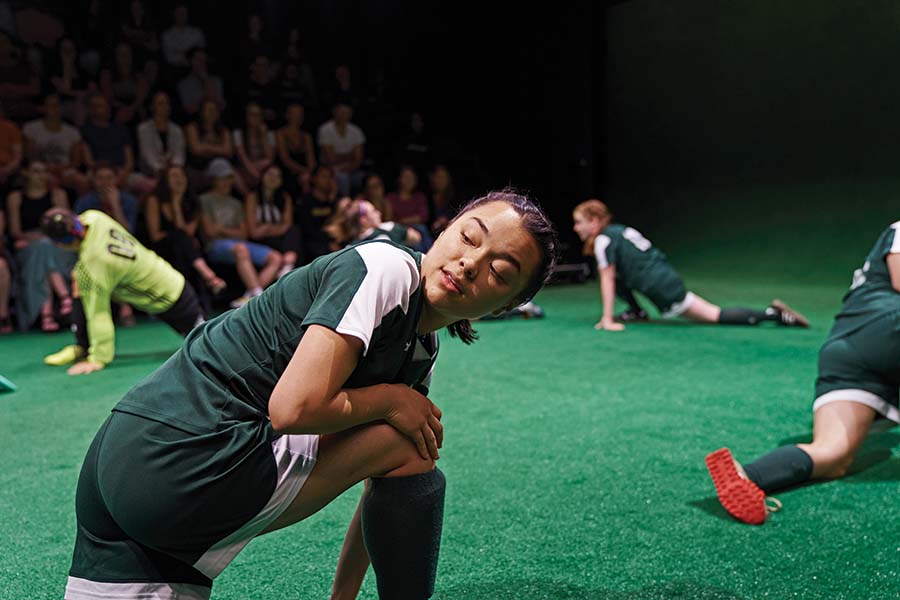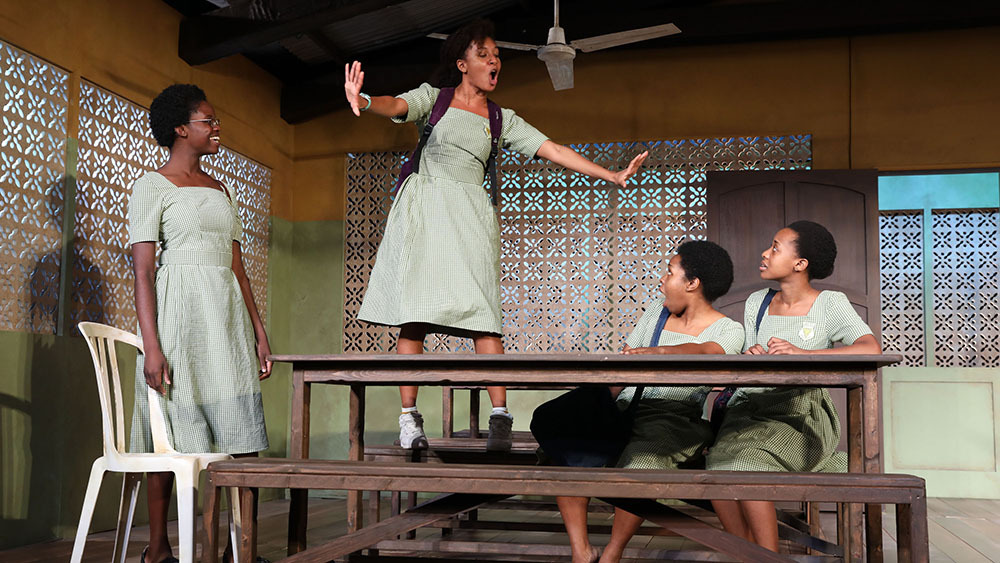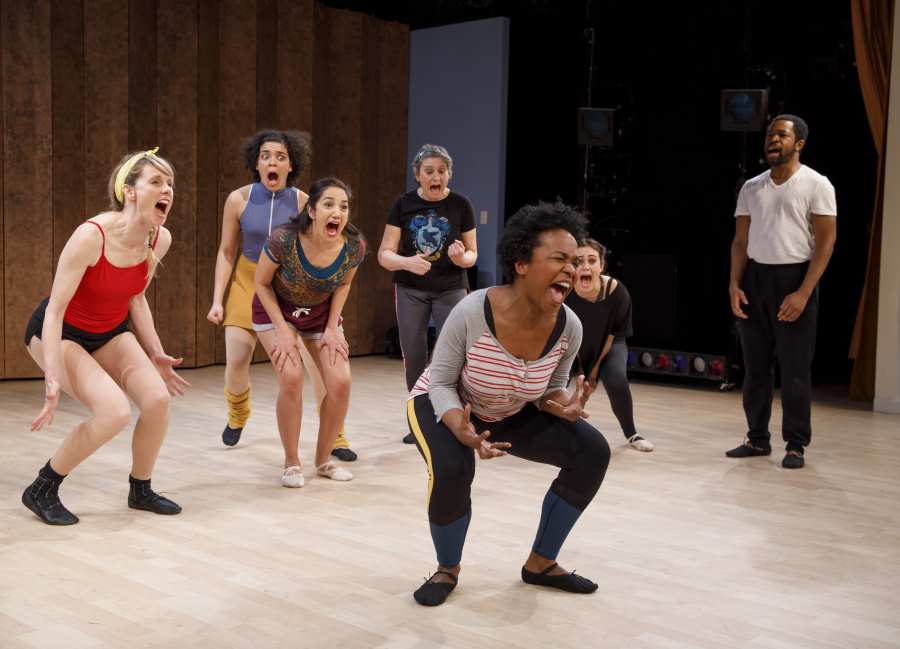Girls kicking soccer balls. Girls dancing in sync. Girls taking turns belting Whitney Houston’s “The Greatest Love of All.”
If you’ve been in a theatre recently, you may have noticed a lot of attention, even raves, for plays about teenage girls. Currently Dance Nation by Clare Barron is enjoying a twice-extended run at Playwrights Horizons Off Broadway (now through June 17); later this year School Girls: The African Mean Girls Play by Jocelyn Bioh will enjoy a remount at MCC Theater, also Off Broadway (Oct. 16-Nov. 25), after an extended run there last December, and will later run at Speakeasy Stage Company in Boston, and Jungle Theater in Minneapolis. Meanwhile The Wolves by Sarah DeLappe, which debuted at Playwrights Realm, is currently having multiple productions around the country (38 upcoming, according to Samuel French, including at Dallas Theater Center, Capital Stage Company, and Southern Rep).
Amid the overwhelming amount of testosterone in most theatre seasons across America, just these three plays making a splash around the country is enough to give the American theatre a much-needed burst of estrogen. The female characters in these plays totals 26, and their dialogue easily passes the Bechdel Test.
As I left Dance Nation recently, I felt something I rarely feel after a play: freakin’ pumped. Like I was 10 feet tall and could crush the world under my feet (I think it had something to do with a line from the play that was running through my head, “I wish that my soul were as perfect as my pussy”—it makes more sense in context, though it’s a rallying cry that would not be out of place at a women’s march).
I had a similar feeling last year the two times I saw Wonder Woman in the movie theatres. That movie fed a hunger in me that I didn’t know I had. It was a hunger for stories that were specifically female, stories about women finding their strength, realizing their power, and not apologizing for it. Women who were not afraid to take up space. Women in communion with each other. If I could, I would pack my bags and fly to Themyscira.
Or maybe I don’t need to. Maybe I just need to go Off-Broadway.
In Dance Nation, a troupe of six 13-year-old girls (and one boy) are learning a new routine in the hopes of making it to the national competition. There is conflict when it’s learned that there will be a solo routine and they have to audition for it. If this were an ’80s movie, the girls would be bad-mouthing each other and sabotaging each other’s efforts. But playwright Clare Barron is more perceptive than that; vying for the male dance teacher’s approval is not at the top of their list. Instead the play becomes a look into the mind of each female character as they individually navigate the cusp of puberty and figure out what kind of women they should be. Do they embrace their burgeoning power or shrink from it?
As one character, Ashlee, says:
Like every time someone has ever told me that I’m beautiful I say: “No.” … This guy, he said to me, “You’re really beautiful” and I just said: “No.” It’s like a reflex. You’re beautiful. No. You’re smart. No. You’re funny. No. You’re beautiful. But sometimes I wonder what would happen, if I really went for it.
As a female writer who’s been in this profession for a bit, I am frequently asked to speak on panels. In February, on a panel at the Women’s Voices Theater Festival in Washington, D.C., I was asked, “What advice would you give a young female writer?” My answer to that ubiquitous question is usually: Be confident and speak up for yourself. The room, with women of all ages, nodded in agreement.
“Confidence” is a mantra I have to keep repeating to myself. It runs counter to what society tells girls and young women. As novelist Chimamanda Ngozi Adichie put it, “We teach girls to shrink themselves, to make themselves smaller. We say to girls, you can have ambition, but not too much. You should aim to be successful, but not too successful. Otherwise, you would threaten the man.”
Or as Barron says in her note in the program for Dance Nation: “I feel a lot of shame when I receive any kind of recognition. In part because I’m not comfortable taking up too much space.”
But the young women of Dance Nation, The Wolves, and School Girls are learning that not only can you take up space, but that taking up space is normal. Like Dance Nation, The Wolves is also about a team of girls, here playing soccer. In the play, as they prepare for various matches, they talk to each other, about everything from immigration and politics to boys and parties. DeLappe’s play is a little less overt than Barron’s; there are no grand speeches. But as in Dance Nation, each girl in The Wolves has an individual voice. It’s DeLappe’s humane treatment of her subjects that makes The Wolves notable: These girls are part cruel and kind, sporty and soft, shy and outspoken. In other words, there are whole worlds within teenage girls and they are complicated AF.

This was by design, as DeLappe told me in 2016. “When I was writing The Wolves, I was thinking about it as a war movie,” she said. “This is a band of sisters and they’re going into battles and their battles are their soccer games. Each of them has a different role and it’s all about their community and their relationships to each other. Which I think is true of girls and of growing up, you do forge your identity through your community.”
We also both agree that culturally there have been very few empowering stories about teenage girls. A touchstone for me as a teen was the film Mean Girls, now a big Broadway musical that sums up its message neatly: “We need to stop beating each other up over every little thing, ‘cause meanwhile, men are running around grabbing butts and shooting everybody.” Still, in both the film and stage musical, to get to that message we must endure two hours of young women undermining each other for male attention and finding power by destroying each other. There must be a better way to make that same point without ridiculing “girl world” in the process.
“Young women, culturally they’re either objectified or they’re vilified,” said DeLappe. “And they’re hated and they’re annoying, [such as] the way they talk and the upspeak and the vocal fry.”
Contrast that with the amount of narrative space and breadth that young men typically occupy, from Huckleberry Finn to Holden Caulfield, or any of the countless tales about white boys and their dogs. Teenage girls are usually lucky to either be the sole woman in a sea of masculinity (Harry Potter), trying to get a boy to notice her (Dirty Dancing), or battling some kind of “teenage girl problem” (like an eating disorder or an unwanted pregnancy). The stories of teenage girls are always inextricably linked to stories about their bodies and how the world responds to it.
Not that teenage girls should be “unsexed” like Lady Macbeth, but the narrative potential of teenage girls extend beyond romance and makeup. Where, for instance, is the story of a girl and her dog?
“I wanted to write this play because I wanted to present a different picture of teenage girls onstage,” said Barron. “One where trauma wasn’t the central narrative. One where ‘being the best’ was.”
Last month, the Cut (a subsection of New York Magazine) ran a series of stories called, “How to Raise a Boy,” about things we should teach boys now in the age of #MeToo and awareness of toxic masculinity. It included a series of videos, of interviews with kids age 6 to 14. One video asked them about gender stereotypes. Two statements stood out to me: Jen Luc, a 10-year-old boy, said that “most boys think girls are all about makeup, dresses and sleepover parties and stuff.” Said 14-year-old Katelynn: “Boys have superhero outfits and Legos, and girls are all Barbies and baby dolls and princesses.”
These kids haven’t lost the squeak in their voice but they already they know what the stereotypes are. How? What kind of stories are young boys and girls being fed?

At first glance School Girls may seem like it perpetuates the tropes that I mentioned above—its characters talk about Calvin Klein dresses, beauty pageants, and face creams. There’s one crucial difference: It’s black girls doing the talking (if well-rounded white teen girls are few and far between, just try to think of any teenage girl of color you’ve seen who isn’t named Moana).
Jocelyn Bioh’s play takes place at an all-girls boarding school in Ghana. The social hierarchy is thrown off when a new student arrives; Ericka is from America, is half-white and hence lighter-skinned than the other girls. The girls all compete to enter a beauty pageant and, no surprise, Ericka is selected. As the character Paulina puts it, “Even with our little bit of money, my mother gave me bleaching cream instead of food—cause that would ‘serve me better in life.’” The play becomes an exploration of colorism, of girls trying to maintain their confidence when the entire world tells them that they are worthless because of their skin tone.
Bioh explained to me that when she was growing up she, like me, only saw white teenage girls on-screen, and felt an affinity for “any character that Molly Ringwald played.” That lack of representation meant that as a dark-skinned black girl, she felt diminished.
Bioh, who is also an actor, admitted, “I struggled for a very long time to own my own beauty in a business that’s based on aesthetics, and tried to form myself to be someone else’s standard of beauty.”
In writing School Girls, she hoped to provide guidance for young women, so that they won’t take as long to love themselves.
“If this play could just be a catalyst for some girl to accelerate that process of acceptance for themselves, that would make me the happiest person ever,” she said. “That’s the goal, totally—to give someone who is struggling the thought that they are enough, that they are amazing and they are incredible. I could be so much further ahead of my career if I had written this play 10 years ago, and understood and accepted myself at that point.”
That got me thinking: If I can leave plays like Dance Nation, The Wolves, and School Girls feeling 10 feet tall and ready to take the world in my hands and crush it, just imagine what a teenage girl would feel. She would see that it’s okay to be loud, okay to be rough, okay if her body isn’t stereotypically perfect—okay to be exactly who she is.
As I left Dance Nation, I heard the woman in front of me remark, “I love 13-year-old girls.” Ditto.


